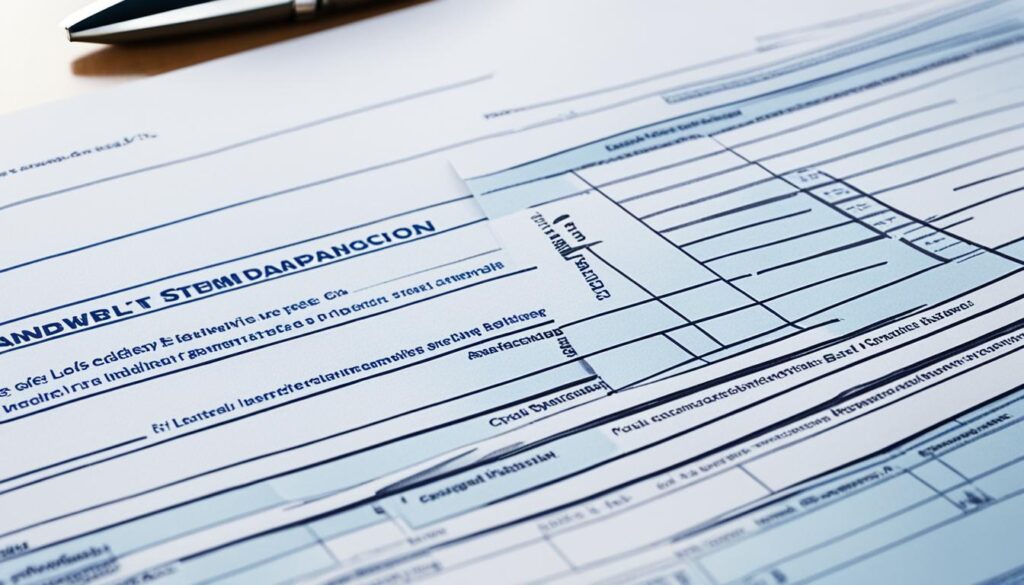Refinancing your personal loan can be a smart financial move if it helps you secure better terms, lower your monthly payments, or save money over the life of the loan. Timing is important, and there are certain factors to consider before deciding to refinance. This article will discuss when it might be advantageous to refinance your personal loan based on your credit score, current loan terms, and potential benefits.
Key Takeaways: Refinance Your Personal Loan
- Refinancing a personal loan can help you secure more favorable terms and save money.
- Consider your credit score, current loan terms, and potential benefits before deciding to refinance.
- Situations where refinancing may be beneficial include dropping interest rates and improving credit scores.
- Refinancing may not be advantageous if the costs outweigh the potential benefits or if your credit score has worsened.
- To refinance, determine your loan amount, check your credit score, shop around for lenders, and submit a loan application.
What Does it Mean to Refinance a Personal Loan?
Refinancing a personal loan refers to the process of taking out a new loan to pay off an existing loan. This financial strategy allows borrowers to potentially obtain a new loan with more favorable terms, such as a lower interest rate or a revised repayment timeline. By refinancing, individuals can better manage their debt and potentially save money in the long run.
When you refinance a personal loan, the funds from the new loan are used to pay off the remaining balance of the existing loan. Once the old loan is paid in full, you will then make regular payments on the new loan according to its terms and conditions. This includes paying interest on the loan amount and adhering to the specified repayment schedule.
One of the key reasons to refinance a personal loan is to secure a lower interest rate. When interest rates go down, refinancing can allow borrowers to take advantage of these lower rates, potentially saving them money over the life of the loan. Additionally, refinancing can also help individuals extend their repayment timeline, providing them with more flexibility in managing their monthly payments.
Also Read : Streamlining Loan Origination: 7 Steps To A Seamless Process
When to Refinance a Personal Loan
There are several situations in which it may be beneficial to refinance your personal loan. One common scenario is when interest rates drop and you can obtain a lower interest rate by refinancing. Additionally, if your credit score has improved since you first obtained your loan, you may qualify for a lower interest rate. Refinancing can also be a good option if you want to switch from a variable rate to a fixed rate, avoid a balloon payment, or lower your monthly payments. Consider your specific financial goals and assess whether refinancing can help you achieve them.
Also Read : The Upsides Of Consolidation Loans: Unlocking Financial Stability And Freedom
Situations When Refinancing a Personal Loan Is Beneficial:
- Interest rates have dropped, allowing you to secure a lower rate through refinancing.
- Your credit score has improved, making you eligible for better terms and rates.
- You want to switch from a variable rate to a fixed rate for more stability.
- You want to avoid a balloon payment that may be due at the end of your loan term.
- You want to lower your monthly payments to fit your budget.
By assessing your current loan terms, interest rates, credit score, and financial goals, you can determine if refinancing a personal loan is the right choice for you. Next, let’s explore the situations in which it may not be advisable to refinance your personal loan.
| Situations to Consider Before Refinancing | Considerations |
|---|---|
| Your current interest rate is already low | Refinancing may not result in significant savings if your current rate is already competitive. |
| Your loan term is almost over | If you’re close to paying off your loan, the costs associated with refinancing may outweigh the benefits. |
| Your credit score has worsened | If your credit score has decreased since obtaining the original loan, you may not qualify for better terms. |
Understanding the situations when refinancing can be beneficial and when it may not be the right move is crucial for making informed financial decisions. Before proceeding with a personal loan refinance, carefully consider your unique circumstances and consult with a financial advisor if necessary. Next, we’ll discuss how to navigate the refinancing process and find the best deal for your personal loan.
Also Read : Understanding The Loan Agreement: Defining Its Purpose And Components

When Not to Refinance a Personal Loan
While refinancing a personal loan can be advantageous in many situations, there are times when it may not be the best move for your financial situation.
One important consideration is your loan balance. If you have a minimal loan balance remaining, the costs associated with refinancing, such as origination fees, may outweigh the potential benefits. It’s crucial to calculate the fees and compare them to the potential savings before deciding to refinance.
Additionally, the interest rate on the new loan should be lower than your current rate for refinancing to make financial sense. If the new interest rate is higher, it would lead to increased costs over the loan term, which is not desirable.
Another factor to consider is your current loan term. If you have a remaining short loan term and only a few payments left, refinancing may not provide significant benefits. The costs and effort involved in refinancing may not be worth the potential savings in such cases.
Your credit score is also essential in determining the success of refinancing. If your credit score has worsened since obtaining the original loan, you may not qualify for favorable refinancing terms. Lenders often consider credit scores as a factor for determining interest rates and loan eligibility.
Also Read : Borrowing With Confidence: Essential Tips For Securing Favorable Loan Terms
Expert Quote:
“While exploring the option to refinance a personal loan, it’s crucial to carefully assess the loan balance, interest rate, current loan term, and impact on your credit score. Refinancing should offer tangible benefits and align with your long-term financial goals.” – [Expert Name], Financial Advisor
Before deciding whether to refinance your personal loan, assess your unique financial situation and consider consulting with a financial advisor to determine if refinancing is the right move for you.
Also Read : The Power of Loan Amortization Calculators: Optimizing Your Financial Strategy

How to Refinance a Personal Loan
If you’re considering refinancing your personal loan, follow these steps to ensure a smooth process:
- Determine the loan amount you need to pay off your current loan, including any prepayment penalties that may apply.
- Check your credit score to assess your eligibility for favorable refinancing terms. A higher credit score can help you qualify for a lower interest rate.
- Review your credit report to ensure its accuracy and identify any areas for improvement that could positively impact your refinancing options.
- Shop around with different lenders to compare rates, terms, and fees associated with refinancing. Consider both banks and online lenders to find the best fit for your needs.
- Submit a loan application with the lender of your choice. Be prepared to provide personal information and documentation, such as proof of income and identification.
- Work closely with the lender throughout the loan processing period. Answer any queries promptly and provide any additional information or documentation requested.
- Review the loan agreement thoroughly before signing. Pay attention to the interest rate, loan term, repayment schedule, and any fees or penalties.
- Once approved, the lender will provide the funds to pay off your existing loan, and you will start making payments on the new loan according to its terms.
By following these steps and carefully considering your loan amount, credit score, and the details of the refinancing offer, you can navigate the process effectively and potentially achieve better loan terms.

Lenders That Allow Refinancing
When it comes to refinancing a personal loan, there are numerous lenders that offer this financial option to borrowers. Whether you want to refinance your personal loan with the same lender or explore different options, it’s crucial to research and compare offers from various lenders to secure the best terms and rates for your refinancing needs.
Some lenders specialize in refinancing loans from other lenders, providing expertise and tailored solutions for borrowers looking to improve their loan terms. On the other hand, there are lenders that offer a wide range of loan refinancing options, accommodating borrowers seeking more flexibility in their refinancing choices.
When choosing a lender for your personal loan refinance, consider several factors that will impact the overall cost and stability of your new loan. Interest rates play a significant role in determining the affordability of your monthly payments and the total amount you’ll pay over the life of the loan.
Loan amounts also vary from lender to lender, and it’s essential to find one that aligns with your refinancing goals. Whether you’re looking to refinance a smaller loan or a larger debt, finding a lender that offers loan amounts suitable for your needs is crucial.
Comparison Table: Lenders for Personal Loan Refinancing
| Lender | Interest Rates | Loan Amounts | Repayment Terms |
|---|---|---|---|
| ABC Bank | 3.5% – 5.25% | $5,000 – $50,000 | 1 – 5 years |
| XYZ Credit Union | 3.25% – 4.75% | $10,000 – $100,000 | 1 – 7 years |
| 123 Online Lenders | 4.0% – 6.0% | $2,000 – $25,000 | 1 – 3 years |
Table: A comparison of lenders offering personal loan refinancing options, including their interest rates, loan amounts, and repayment terms.
As you can see from the table above, different lenders offer varying interest rates, loan amounts, and repayment terms. It’s crucial to compare these factors and consider your financial situation and goals before making a decision. By selecting the right lender for your personal loan refinance, you can ensure a smooth refinancing process and potentially save money on interest charges or secure more manageable monthly payments.

Remember to explore your options and shop around for the best lender that suits your specific refinancing needs. By taking the time to research and compare lenders, you can find the most favorable terms and rates that align with your financial goals, allowing you to make the most of your personal loan refinance.
When Refinancing Is a Good Idea
Refinancing a personal loan can be a smart financial move that provides you with various benefits. Here are some situations where refinancing may be the right choice:
- If your credit score has improved since you first obtained your loan, refinancing can help you secure a lower interest rate. This can potentially save you money on interest charges over the life of the loan.
- For those who need lower payments to fit their budget, refinancing can make it easier by extending the loan term or adjusting the interest rate.
- Individuals who are looking to repay their loan faster may consider refinancing to opt for a shorter loan term. This allows them to save on interest charges and become debt-free sooner.
- Another compelling reason to refinance is to take advantage of lower interest rates. If the current market rates are lower than the rate on your existing loan, refinancing can help you secure better terms and save money in the long run.
- If you have a relatively low debt-to-income ratio, refinancing can be a useful tool to improve your overall financial health. It can help you consolidate higher-interest debt into one manageable loan, making it easier to stay on top of your monthly payments.
Before deciding to refinance, thoroughly assess your financial situation and goals. Consider factors such as your credit score, desired payment amount, loan term, and interest rates. By carefully evaluating your options, you can determine whether refinancing your personal loan aligns with your financial objectives.
Refinancing a personal loan can be a strategic move to save money, secure better loan terms, and achieve your financial goals. However, it’s essential to weigh the costs and benefits and make an informed decision based on your unique circumstances.
Remember to consult with a financial professional or loan officer to gain a better understanding of how refinancing may impact your specific situation. Look for reputable lenders that offer competitive rates and favorable terms to maximize the potential benefits of refinancing.
When You Should Wait to Refinance a Personal Loan
While refinancing can be advantageous in many situations, there are times when it may be best to wait. Consider the following factors before making a decision:
1. Lower Rate Eligibility
If you’re unable to qualify for a lower interest rate, refinancing your personal loan may not result in significant savings. Lenders typically offer more favorable rates to borrowers with good credit scores and a strong financial history. Before refinancing, check your credit score and assess whether it has improved enough to secure a better rate. If not, it might be wise to work on improving your credit before considering refinancing.
2. Additional Fees
Refinancing a personal loan often incurs additional fees, such as origination fees. These fees can offset the potential benefits of refinancing. Before moving forward, carefully review the cost of refinancing and compare it against the potential savings. Calculate the breakeven point to determine if the long-term savings outweigh the upfront fees. If the fees negate the advantages, it may be best to delay refinancing.
3. Credit Score Impact
If your credit score has decreased since you obtained your original loan, you may not be eligible for better terms when refinancing. Lenders assess creditworthiness when considering refinancing applications, and a lower credit score can lead to higher interest rates or unfavorable loan terms. In this case, take steps to improve your credit score before pursuing refinancing options. Build a history of consistent on-time payments, reduce credit card balances, and address any errors on your credit report.
“Before refinancing your personal loan, carefully consider your eligibility for a lower interest rate, the additional fees involved, and the impact of your credit score.”
By assessing these key factors, you can make an informed decision and optimize the potential benefits of refinancing. Depending on your individual circumstances, waiting for a more favorable rate, avoiding additional fees, or improving your credit score may be the best course of action.

| Factors to Consider | Wait to Refinance |
|---|---|
| Lower rate eligibility | If you’re unable to qualify for a lower interest rate |
| Additional fees | If the fees offset the potential benefits |
| Credit score impact | If your credit score has decreased since obtaining the original loan |
Be patient and take the time to improve your financial standing before proceeding with refinancing your personal loan. Waiting for the right circumstances can result in a more favorable outcome and long-term financial benefits.
Frequently Asked Questions about Refinancing a Personal Loan
Here are some common questions people have about refinancing a personal loan:
- Does refinancing hurt your credit score?Applying for a personal loan, including a refinance, may result in a temporary dip in your credit score. However, as long as you make your payments on time, the long-term impact should be minimal.
- Is it good to refinance a personal loan?Refinancing can be a good option if it helps you secure a lower interest rate, lower your monthly payments, or pay off your loan faster. Assess your specific financial situation and goals to determine if refinancing is right for you.
- Can you refinance a personal loan with the same lender?In many cases, you can refinance a personal loan with the same lender or choose a different lender. It’s important to compare offers from multiple lenders to find the best terms and rates for your refinancing needs.
- Do you need good credit to refinance a personal loan?While having good credit can help you qualify for better terms and rates, there are lenders that offer refinancing options for borrowers with less-than-perfect credit. Shop around and compare offers to find a lender that suits your credit profile.
- Are there any fees involved in refinancing a personal loan?Refinancing may incur fees such as origination fees or prepayment penalties, depending on the lender and loan terms. It’s important to review the terms and costs associated with refinancing before making a decision.
Tips to Consider When Refinancing a Personal Loan:
- Check your credit score and review your credit report before applying for a refinance.
- Compare offers from multiple lenders to find the best terms and rates for your refinancing needs.
- Consider any fees associated with refinancing, such as origination fees or prepayment penalties.
- Assess your financial goals and determine if refinancing aligns with your long-term objectives.
By understanding the basics of refinancing a personal loan and considering the frequently asked questions, you can make an informed decision about whether refinancing is the right move for you.
Also Read:- Unlocking Home Equity: Understanding Home Equity Loans
Conclusion
Refinancing your personal loan can be a smart financial move if it helps you achieve your long-term financial goals. By securing the best interest rate and more favorable terms, you have the potential to lower your monthly payments, save money on interest charges, and even pay off your loan faster. However, before deciding to refinance, it’s crucial to carefully consider your current loan terms, credit score, and the potential benefits.
Start by comparing quotes from different lenders to ensure you’re getting the best interest rate and terms for your personal loan refinance. Take into account any costs involved, such as origination fees, to determine if refinancing will truly save you money in the long run. Additionally, evaluate how refinancing aligns with your financial objectives and if it complements your overall financial plan.
Remember, your credit score plays a significant role in your ability to qualify for a better interest rate when refinancing. If your credit score has improved since you obtained your original loan, you may be eligible for a more favorable rate. However, if your credit score has worsened, it may be wise to work on improving it before considering refinancing.
Ultimately, by carefully evaluating your current loan terms, credit score, and potential benefits, you can make an informed decision about whether refinancing your personal loan is the right move for you. Refinancing has the potential to provide financial relief and help you achieve your goals, but it’s essential to approach it with a clear understanding of your individual circumstances and objectives.
FAQs
Q: When should I consider refinancing my personal loan?
A: You may want to consider refinancing your personal loan if you can get a lower interest rate, reduce your monthly payments, or pay off the loan sooner,hard credit,best personal loan ,refinance a loan ,lender may ,could save you money,apply for a new loan ,loan modification,loan funds,,first loan ,get a loan ,.
Q: How does refinancing a personal loan affect my credit score?
A: Refinancing a personal loan may impact your credit score as it involves a new credit inquiry and potentially extending your loan term.
Q: What are the disadvantages of refinancing a personal loan?
A: Disadvantages of refinancing a personal loan include potentially paying more in interest over time and the impact on your credit score.
Q: What factors should I consider when refinancing a personal loan?
A: You should consider the new loan offer, how it aligns with your financial goals, and if it makes sense to refinance based on your current loan terms.
Q: How can I determine if it makes sense to refinance my personal loan?
A: You can use a personal loan calculator to compare your current loan payments with the potential payments on your new loan to see if it’s beneficial for you.
Q: Can I refinance a personal loan with a longer term?
A: Depending on your credit history and lender, you may be able to refinance your existing loan with a new one that has a longer loan term.
Q: Should I refinance my loan to get a new personal loan?
A: You may want to consider refinancing your loan to get a new personal loan if it offers better terms or aligns more closely with your financial needs.
Q: What should I keep in mind before applying for a new personal loan?
A: Before applying for a new personal loan, consider how it may affect your credit score, the impact of extending your loan term, and if it aligns with your financial goals.
Does refinancing hurt your credit score?
Applying for a personal loan, including a refinance, may result in a temporary dip in your credit score. However, as long as you make your payments on time, the long-term impact should be minimal.
Is it good to refinance a personal loan?
Refinancing can be a good option if it helps you secure a lower interest rate, lower your monthly payments, or pay off your loan faster. Assess your specific financial situation and goals to determine if refinancing is right for you.
Can you refinance a personal loan with the same lender?
In many cases, you can refinance a personal loan with the same lender or choose a different lender. It’s important to compare offers from multiple lenders to find the best terms and rates for your refinancing needs.
Do you need good credit to refinance a personal loan?
While having good credit can help you qualify for better terms and rates, there are lenders that offer refinancing options for borrowers with less-than-perfect credit. Shop around and compare offers to find a lender that suits your credit profile.
Are there any fees involved in refinancing a personal loan?
Refinancing may incur fees such as origination fees or prepayment penalties, depending on the lender and loan terms. It’s important to review the terms and costs associated with refinancing before making a decision.
